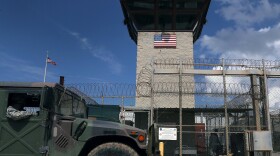
Arun Rath
Beginning in October 2015, Arun Rath assumed a new role as a shared correspondent for NPR and Boston-based public broadcaster WGBH News. He is based in the WGBH newsroom and his time is divided between filing national stories for NPR and local stories for WGBH News.
In this role, Rath's reporting beat covers the science of learning, exploring how the brain functions – how we experience emotions, making errors or boredom – and how we respond to different styles of learning. The beat dovetails well with several of WGBH News' core regional coverage areas, bolstering its reporting on higher education (On Campus), innovation (Innovation Hub) and science (Living Lab from WGBH and WCAI in Woods Hole on Cape Cod).
Previously he served as weekend host of All Things Considered. In that role, every Saturday and Sunday, Rath and the All Things Considered team offered an hour-long exploration of compelling stories, along with in-depth interviews, breaking news, cultural reviews and reports from NPR bureaus throughout the U.S. and around the world.
Over his career, Rath has distinguished himself in public media as a reporter, producer and editor, including time as a senior reporter for the PBS series Frontline and The World® on WGBH Boston. He began his journalism career as an NPR intern at an NPR call-in program called Talk of the Nation, eventually joining the staff and becoming the show's director after working on several NPR News programs during the 1990s. In 2000, he became senior producer for NPR's On the Media, produced by WNYC, where he was part of a team that tripled its audience and won a Peabody Award. He spent 2005 as senior editor at the culture and arts show Studio 360 from PRI and WNYC. Rath moved to television in 2005 to report and manage radio partnerships for Frontline; he also reports on culture and music for the PBS series Sound Tracks. At Frontline and The World®, Rath specialized in national security and military justice. He reported and produced three films for Frontline, the latest being an investigation of alleged war crimes committed by U.S. Marines in Haditha, Iraq.
-
Reno, Nev., is enjoying a tech boom. Giants like Apple, Google and Tesla are all there. The transformation is also being driven by some homegrown start-ups, but some worry Reno will become unaffordable.
-
As the Defense Department continues to identify the remains of servicemen lost in foreign wars, Hattie Johnson informs the families who have been waiting decades for information.
-
An Army medic killed in Korea in 1950 was brought back to Hawaii after the war as an unknown soldier. New tests have been able to identify him, and he was returned to Holyoke, Mass., for burial.
-
Despite President Obama's executive order to close the Guantanamo Bay prison, dozens of detainees from the war on terrorism are still there.
-
Camp 5, built in 2003 when it seemed the Guantanamo Bay facility was there to stay, will be converted, in part, into a medical clinic. It was where "non-compliant" detainees once were held.
-
A new report from the office of the Massachusetts Attorney General's office details egregious misconduct and extensive drug use on the job by a former employee of the state crime lab.
-
Harvard Law School is considering changing its official seal, which currently honors a slaveholder who was an early donor to the school. That's in response to student protests.
-
Urban foragers don't just pick their meals from the trash; many eat only the finest, freshest produce — picked from city trees. The League of Urban Canners harvests fruit from trees to make jam.
-
Geoff Sobelle calls his new one-man play "a meditation on our relationship to things." On a visit to the show, NPR's Arun Rath gathers a lesson in the meaning of stuff-- and the memories it can bear.
-
Arun Rath says farewell, as his time hosting weekend All Things Consideredcomes to a close. He welcomes the new host, Michel Martin.




